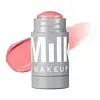What's inside
What's inside
 Key Ingredients
Key Ingredients

 Benefits
Benefits

 Concerns
Concerns

 Ingredients Side-by-side
Ingredients Side-by-side

Ricinus Communis Seed Oil
MaskingPersea Gratissima Oil
Skin ConditioningEthylhexyl Palmitate
EmollientHelianthus Annuus Seed Wax
Skin ConditioningCandelilla Cera
EmollientC12-15 Alkyl Benzoate
AntimicrobialIsononyl Isononanoate
EmollientSilica
AbrasiveParfum
MaskingCitrus Aurantium Dulcis Peel Wax
Skin ConditioningMangifera Indica Seed Butter
Skin ConditioningPrunus Armeniaca Kernel Oil
MaskingTocopheryl Acetate
AntioxidantHydrogenated Vegetable Oil
EmollientMica
Cosmetic ColorantStearalkonium Hectorite
Gel FormingIsopropyl Myristate
EmollientPolyhydroxystearic Acid
EmulsifyingBis-Stearyl Dimethicone
EmollientIsopropyl Titanium Triisostearate
EmollientSynthetic Fluorphlogopite
Tin Oxide
AbrasivePalmitic Acid
EmollientLimonene
PerfumingLinalool
PerfumingCI 77891
Cosmetic ColorantCI 77492
Cosmetic ColorantCI 15850
Cosmetic ColorantCI 73360
Cosmetic ColorantCI 19140
Cosmetic ColorantRicinus Communis Seed Oil, Persea Gratissima Oil, Ethylhexyl Palmitate, Helianthus Annuus Seed Wax, Candelilla Cera, C12-15 Alkyl Benzoate, Isononyl Isononanoate, Silica, Parfum, Citrus Aurantium Dulcis Peel Wax, Mangifera Indica Seed Butter, Prunus Armeniaca Kernel Oil, Tocopheryl Acetate, Hydrogenated Vegetable Oil, Mica, Stearalkonium Hectorite, Isopropyl Myristate, Polyhydroxystearic Acid, Bis-Stearyl Dimethicone, Isopropyl Titanium Triisostearate, Synthetic Fluorphlogopite, Tin Oxide, Palmitic Acid, Limonene, Linalool, CI 77891, CI 77492, CI 15850, CI 73360, CI 19140
Isononyl Isononanoate
EmollientCetyl Ethylhexanoate
EmollientTitanium Dioxide
Cosmetic ColorantPolyglyceryl-2 Triisostearate
EmulsifyingMica
Cosmetic ColorantHydrogenated Polyisobutene
EmollientHexyl Laurate
EmollientCeresin
Emulsion StabilisingSilica
AbrasiveVinyl Dimethicone/Methicone Silsesquioxane Crosspolymer
Ozokerite
Emulsion StabilisingCetyl Palmitate
EmollientSilica Dimethyl Silylate
EmollientCaprylic/Capric Triglyceride
MaskingPolyhydroxystearic Acid
EmulsifyingMethicone
EmollientCaprylyl Glycol
EmollientCI 15850
Cosmetic ColorantCI 45410
Cosmetic ColorantEthylhexyl Palmitate
EmollientIsopropyl Myristate
EmollientIsostearic Acid
CleansingLecithin
EmollientPolyglyceryl-3 Polyricinoleate
EmulsifyingAcid Red 33
CI 42090
Cosmetic ColorantIsononyl Isononanoate, Cetyl Ethylhexanoate, Titanium Dioxide, Polyglyceryl-2 Triisostearate, Mica, Hydrogenated Polyisobutene, Hexyl Laurate, Ceresin, Silica, Vinyl Dimethicone/Methicone Silsesquioxane Crosspolymer, Ozokerite, Cetyl Palmitate, Silica Dimethyl Silylate, Caprylic/Capric Triglyceride, Polyhydroxystearic Acid, Methicone, Caprylyl Glycol, CI 15850, CI 45410, Ethylhexyl Palmitate, Isopropyl Myristate, Isostearic Acid, Lecithin, Polyglyceryl-3 Polyricinoleate, Acid Red 33, CI 42090
 Reviews
Reviews

Ingredients Explained
These ingredients are found in both products.
Ingredients higher up in an ingredient list are typically present in a larger amount.
Ci 15850 is the pigment color red. It is an azo dye and created synthetically.
Azo dyes need to be thoroughly purified before use. This allows them to be more stable and longer-lasting.
This ingredient is common in foundations, lipsticks, and blushes. This color is described as brown/orangey red.
It has many secondary names such as Red 6 and Red 7. According to a manufacturer, Red 6 usually contains aluminum.
Learn more about CI 15850Ethylhexyl Palmitate, also known as octyl palmitate, is created from 2-ethylhexyl alcohol and palmitic acid. It is a fatty acid ester.
The fatty acid content of Ethylhexyl Palmitate makes it an emollient. Emollients help soften and hydrate your skin by trapping moisture within.
Ethylhexyl Palmitate is also used to help improve the texture of cosmetics. It helps other ingredient dissolve in products and help disperse ingredients more evenly.
You'll likely find this ingredient in sunscreen, as it is often used to mix UV-blocking ingredients such as avobenzone and ethylhexyl triazone.
It can also help stabilize the fragrances in a product as a fragrance fixative.
Ethylhexyl Palmitate can be used to substitute mineral oil.
Due to its high fatty acid content, it may not be fungal-acne safe.
Learn more about Ethylhexyl PalmitateIsononyl Isononanoate is a synthetic skin-conditioner and texture enhancer. It is created from nonanoic acid, a fatty acid found in cocoa and lavender oil.
As an emollient, Isononyl Isononanoate helps keep your skin soft and smooth. This is because emollients create a barrier on the skin to trap moisture in.
Isononyl Isononanoate helps give products a velvet feel and improves spreadability.
Learn more about Isononyl IsononanoateIsopropyl Myristate is an emollient, thickening agent, and texture enhancer. It is created from isopropyl alcohol and myristic acid.
It is used to help other ingredients be better absorbed. It is also an emollient and may help soften and hydrate the skin.
The comedogenic rating of this ingredient depends on the concentration. Lower amounts results in a lower rating.
Isopropyl Myristate may not be fungal acne safe. It can potentially worsen acne prone skin.
Learn more about Isopropyl MyristateMica is a naturally occurring mineral used to add shimmer and color in cosmetics. It can also help improve the texture of a product or give it an opaque, white/silver color.
Serecite is the name for very fine but ragged grains of mica.
This ingredient is often coated with metal oxides like titanium dioxide. Trace amounts of heavy metals may be found in mica, but these metals are not harmful in our personal products.
Mica has been used since prehistoric times throughout the world. Ancient Egyptian, Indian, Greek, Roman, Aztec, and Chinese civilizations have used mica.
Learn more about MicaPolyhydroxystearic Acid is a soft wax made from castor oil.
It is is a texture thickener, emulsifier, and film-former. Emulsifiers prevent ingredients from separating, such as oils and waters.
Polyhydroxystearic Acid may not be fungal acne safe.
Learn more about Polyhydroxystearic AcidSilica, also known as silicon dioxide, is a naturally occurring mineral. It is used as a fine, spherical, and porous powder in cosmetics.
Though it has exfoliant properties, the function of silica varies depending on the product.
The unique structure of silica enhances the spreadability and adds smoothness, making it a great texture enhancer.
It is also used as an active carrier, emulsifier, and mattifier due to its ability to absorb excess oil.
In some products, tiny microneedles called spicules are made from silica or hydrolyzed sponge. When you rub them in, they lightly polish away dead skin layers and enhance the penetration of active ingredients.
Learn more about Silica